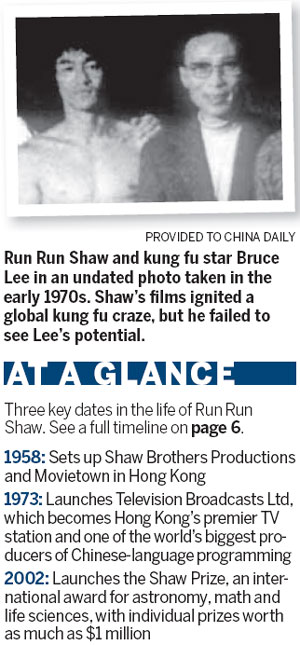Movie mogul Run Run Shaw, 107, dies in HK
By Raymond Zhou (China Daily) Updated: 2014-01-08 08:14

Run Run Shaw, media mogul and philanthropist, died at his home in Hong Kong on Tuesday morning.
Arguably the greatest and longest-operating force in Chinese-language film and television, Shaw was 107, according to the traditional counting method used in his hometown.
He was instrumental in maneuvering the Chinese film industry from silent movies to talkies, from black-and-white to color, from talking to singing and dancing, and from a female-dominated genre to a male-dominated kung fu fight fest.
He later switched from movies to television.
In his personal life, Shaw evolved from counting the pennies to lavishing his money on worthy causes, such as education and healthcare.
His longevity was matched by his industry and dogged commitment to the rules. His populist aesthetics kept him in touch with the grassroots a lot of the time and his movies reinforced traditional Chinese values, rather than blazing new trails or conquering new frontiers.
Shaw's career spanned many decades. He started in movie distribution and exhibition before moving into production, turning himself into the biggest film producer in the Chinese-speaking world for a long period.
When his movie industry career began to slip, he found a new realm in television, and his influence is still felt today, along with the stars he minted.
For an emerging generation in China that has never heard of Shaw's contribution to the country's cinema, his name often features prominently on the buildings where they absorb knowledge, a testament to his enormous generosity to educational and other charities.
|
Related: |
Younger sibling
Run Run Shaw began his movie career doing odd jobs for his elder brothers' company, the equivalent of a mailroom clerk in Hollywood, but with a much more versatile role. He had just finished high school at an US-run establishment in Shanghai and his father expected him to go on to college. But Shaw seemed to love what he was doing at Tianyi Film Co, rotating through every job, including scriptwriter, actor, director and, finally, cinematographer, a role in which he excelled.
Run Run's eldest brother founded Tianyi in 1924. The company quickly grew into one of the top three film studios in Shanghai through its adaptations of Chinese folk tales that reinforced traditional moral values, which ran counter to the enlightenment movement of the day. This populist strategy in subject matter continued through all the ensuing incarnations of the brothers' entertainment empire.
- More female officials caught in corruption
- Whampoa veterans recorded with glory
- Police bust 9 terrorist groups in Xinjiang
- Knife-wielding attackers seized in Xinjiang
- New regulation leads to drop in petitioned cases
- Hunan plant shut as probe into lead poisoning begins
- Police boost efforts to combat gambling
- Project offers jobs openings to legal experts
- Experts: Dog meat festival 'illegal'
- Nation looks to upgrade
pipeline networks






